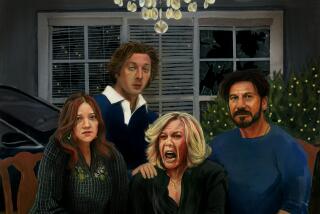A Quickie Dinner, Followed by a Flying Beer
- Share via
Thanksgiving dinner. A typically thankless chore, performed mainly by Tabitha. Three days of grocery shopping and turkey ordering and stuffing preparation, six hours of actual cooking. But from the exact moment they are asked to sit down, the four children at the table -- ages 7, 5, 5 and 2 -- all want to leave. To prevent the dinner ending before it begins, someone suggests that the 7-year-old recite a poem by Robert Louis Stevenson that she has recently memorized for school. So she does, until she stumbles, forgets the final couplet and breaks down into mysterious and uncontrollable sobs.
“Wait, wait, wait,” some other grown-up says, in an attempt to distract her from her misery and make this a Thanksgiving to be proud of. “Let’s all go around the table and say what we are thankful for.”
As we do, the children push their food idly around on their plates. The moment we have run out of ideas for things to be thankful for, all four of them rise and make a dash for the playroom. The dinner has lasted exactly 9 1/2 minutes.
After dinner, we head off to the local park. There we run into a good friend of Tabitha’s, along with her dreaded husband. This is the problem with letting your wife go off and make friends of her own: Their husbands become your problem. This chap presents special difficulties because he is so relentlessly nice. It’s deeply unfair for me to be so relentlessly miserable in his company, as he does nothing even the slightest bit offensive. He is always chipper and upbeat and friendly -- which of course makes my longing to escape him even more unforgivable. Immoral, even.
“Did you have a great Thanksgiving?” he asks brightly when I see him. “Yes,” I say. “It lasted 9 1/2 minutes.”
“It’s my favorite holiday!” he says. As usual, I can’t think of what to say next, and the conversation dies.
A red-eye from San Francisco to Newark. I get off the plane, race to Giants Stadium, spend the day interviewing pro football players for a magazine article, then drive back to a hotel room with a panoramic view of the New Jersey Turnpike. There, bleary-eyed, I channel-surf. At length I come upon the very end of what appears to be a boring basketball game between the Detroit Pistons and the Indiana Pacers.
Just as I’m about to hit the remote, a Piston pushes a Pacer, both benches clear, and the players go about the usual business of pretending to want to fight. (“Hold me back!” “Hold me back!” you can almost hear them hollering, Fred Sanford-like.) The scene is just about over when, suddenly, half the Indiana team, led by star Ron Artest, charges into the stands and throws punches at the Detroit fans. The cameras drink in every detail, the announcers attempt to find something useful to say, and the courtside reporter explains that the whole thing was the fans’ fault. A thrill in his voice, he explains that the fight began when a Detroit fan chucked a bottle at Artest’s head. Artest identified the culprit and took off after him. It was, the broadcasters agree, a simple act of self-defense.
After the game, in the studio, one of the ESPN post-game analysts calls the Detroit fans “punks.” Another says they deserve the beating. Nobody makes the obvious point that basketball, like baseball, is paying a price for charging fans more and more money to sit closer and closer to the action. The familiarity is breeding contempt. I turn off the television and fall asleep.
When I wake up, the story, and its moral, have been completely revised. The chucked bottle has become a plastic cup. Artest has punched the wrong guy -- several wrong guys, it would seem. Some of the same people who were disgusted by the Detroit fans are now even more disgusted by the Indiana Pacers. The NBA quickly banishes Artest for the rest of the season, docks him $5.3 million in pay and casts him as the villain of the piece. Thus do even NBA players come to learn the first principle of American life: The customer is always right. It’s easy to see why the NBA’s brass feels it must demonize the players for beating up their customers, but in doing it don’t they make it more, not less, likely that the fans will seek to provoke the players to violence?


